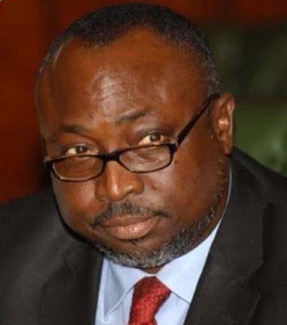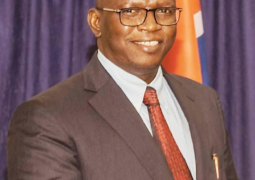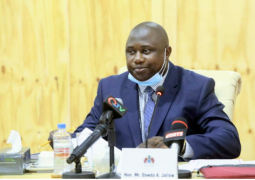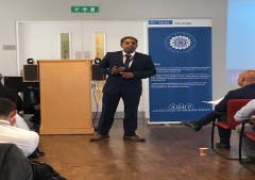
Last Wednesday, Joseph Aper Wowo appealed the July 27 decision of Justices Ricky Rahim and Jacqueline Wilson to dismiss his petition, saying “he does not possess the attributes to be admitted to the practice of law in TT.”
Wowo was the chief justice of Gambia during the tenure of then-president Yahiya Jammeh, a former military leader who held office from 1994-2017.
He filed his petition on September 27, 2022, seeking an order that he be declared a fit and proper person to be admitted as an attorney in TT.
His petition was filed without a certificate of fitness from the Law Association, to which he applied in November 2021.
In dismissing his petition, Rahim and Wilson said Wowo did not explain why he did not make certain disclosures to the association, knowing that he would have been aware they were important and relevant to the grant of a certificate of fitness.
“In all of the circumstances therefore the court finds that the actions of the petitioner in making his application lead to the conclusion that he was dishonest in the manner in which he pursued it and therefore he does not possess the attributes to be admitted to the practice of law in TT.
“Honesty and trust are the bulwarks of confidence in the legal profession and absolute requirements that lie at the core of the relationship between the public and the lawyers entrusted through the admission of the Supreme Court to represent them.
“The court would therefore have held that the public could not reasonably be expected to have confidence in the admission of the candidate.”
The disclosures related mainly to reports relating to his conviction in 2014 by a special criminal court in Banjul, Gambia, after a trial of a 13-count indictment.
The charges included abuse of office, breach of trust, conspiracy to defeat justice, offences relating to judicial proceedings and others alleged to have been committed in 2012 while acting as chief justice.
He was sentenced to two years in prison, but after his appeals to the Gambian courts were dismissed, he received a president’s pardon from Jammeh in August 2015, his unserved sentence was remitted and he was released.
Wowo filed a claim in the Community Court of Justice of the Economic Community of West African States (ECOWAS) alleging that his human rights were breached by the conduct of the proceedings in the Gambian courts.
The ECOWAS court held that Wowo’s right to a fair trial had been breached and the acts to remove him from office, his trial and conviction were biased, lacking in independence and amounted to non-compliance with due process.
However, since it did not have the power of an appellate court, the ECOWAS court said it could not interfere with decisions of the national courts.
In their ruling, Rahim and Wilson said, “It follows that the petitioner’s convictions have never been overturned as a matter of law and of record. This of course by itself is not a basis to refuse the relief sought in the petition as there are several other factors to be considered by this court.”
In his appeal, Wowo said the two judges erred in law by failing to consider that Gambia and Nigeria were subject to the jurisdiction of the ECOWAS court because both countries were signatories to the African Charter on Human Rights. His appeal also said they failed to consider that the treaty gives the judgment of the court a binding authority over all member states, individuals and institutions.
The appeal further contends that the judges made an error when they considered the ECOWAS court’s judgment was only a cancellation of the penalty imposed on conviction, but failed to consider that having held that his criminal trial was unlawful, his conviction was also declared unlawful entirely.
In all, Wowo filed nine grounds of appeal challenging Rahim and Wilson’s decision.
In his petition to practise, Wowo said he was admitted to the Nigerian bar in December 1991. Wowo produced a letter of good standing from the Nigerian bar, Warri Branch, the district in which he was born. He also received a legal education certificate (LEC) on July 2, 2021, after a period of study at the Norman Manley Law School in Jamaica.
He has a bachelor of laws degree from the University of Nigeria, and a master’s of law from the University of Oklahoma, and also presented a certificate of good conduct from the principal of the Norman Manley Law School.
In their ruling, the judges noted that the only issue in dispute was whether he was of good character and eligible to be admitted to practice, as he met the other criteria for admission.
Wowo also presented a letter of good conduct from a Nigerian surgeon in TT.
In their ruling, the judges also added, “In all of the circumstances therefore the court finds that the actions of the petitioner in making his application lead to the conclusion that he was dishonest in the manner in which he pursued it and therefore he does not possess the attributes to be admitted to the practice of law in TT.”
In response to the petition, LATT had asked the court to consider Wowo’s application for the certificate of fitness, particularly as, it alleged, he did not disclose his convictions when he made it.
The correspondence between LATT and Wowo was referred to by the judges. The association, in response to his application, and after verifying the letter from the Nigerian Bar Association, had asked him to provide further documentation, the ruling noted.
“The petitioner responded the very day, attaching a copy of his resignation from the office of Chief Justice and a copy of the ECOWAS decision.
“In his reply, he set out that he refused to do what the then president of Gambia wanted him to do, namely to use the court to witch hunt his political enemies, that he held a press conference, and the president then threatened publicly to jail him.
The association also wrote to the Gambia Bar Association. In response to this, Wowo told LATT there was “bad blood” between him and that association.
In a written submission relating to his petition to practise, Wowo explained his failure to make the relevant disclosure, as he mistakenly believed since he had been pardoned, he did not have to disclose the unlawful conviction to the association.
“The applicant’s statements are an admission that, in hindsight, he may be considered to have suppressed relevant information in making his application. He seeks to explain that it was not his intention to mislead.”
However, the judges said the court did not accept his explanation for failing to disclose to the association when he made his application, since he was a former chief justice and had been a lawyer since 1992.
“It goes against the grain of reason that the petitioner would not have appreciated that the convictions were of fundamental importance to the process of obtaining a COF and were relevant to the exercise of any assessment to be conducted by the LATT.
“It would have been obvious to him that this was the case regardless of the findings of the ECOWAS, and the court so finds.”
Attorneys Ravi Heffes-Doon, Jonathan Khan and Nabilah Khan represented the Law Association at the High Court hearing of the petition. Source: NEWSDAY




